2023
Our website has moved!
The WHO Centre for Health Development (WHO Kobe Centre – WKC) has changed its website location to a new, simple web address: https://wkc.who.int/
We will no longer be updating the current website (https://extranet.who.int/kobe_centre/en), and no new content will be uploaded here. Visitors to this old site will still be able to see old content until the middle of December, after which it will be archived.
Please go to https://wkc.who.int/ to see all the new, improved features and see how easy it is to navigate the site. We hope you will visit us soon!
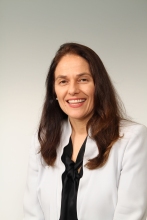
2023 UHC Day Message of Dr Sarah Barber, Director, WHO Centre for Health Development
On 12 December, Universal Health Coverage (UHC) day, we at the WHO Centre for Health Development (WHO Kobe Centre - WKC) are encouraged by the renewed commitment of the global community to achieving UHC for all, arising from the United Nations Political Declaration on UHC in New York on 21 September 2023.
With the theme this year being “Health for All: Time for Action”, WKC affirms that UHC is central to achieving all of the Sustainable Development Goals (SDGs).
Health service coverage and financial protection are two key indicators that measure progress on UHC. WKC’s research on unmet needs, particularly of older populations, contributed to the 2023 WHO-World Bank Global Monitoring Report on UHC, and informed discussions at the United Nations High-Level Meeting on UHC in September 2023.
Financing UHC is an investment, not a cost. Importantly, improving the quality of care for people with chronic conditions is key to reducing preventable deaths and advancing UHC. With rapid population ageing, changes are needed in how to pay for chronic care that provides incentives for quality.
Our work on the WHO Flagship Project with partners at WHO Headquarters and the OECD on purchasing arrangements to strengthen quality care for chronic diseases explored whether different types of payment arrangements incentivised healthcare providers to provide better quality care for chronic conditions.
While rigorous evaluations of effectiveness are still lacking, case studies in eight countries* found what facilitated the delivery of quality chronic care included health information systems and technology, strong leadership and multistakeholder engagement. Our evidence shows there should be a stronger focus on healthcare delivery models and how payments can support changes in service delivery mechanisms to improve quality.
This UHC Day, we join with millions around the world in urging leaders to make smarter investments in health to move the world closer to UHC by 2030 and deliver health for all. The consequences of underinvesting in UHC are unaffordable.
*For more information, see the case studies on Australia, Canada, Chile, China, Germany, Indonesia, South Africa and Spain.

Global experts met in Kobe, Japan to discuss effective strategies for health emergency and disaster risk management
The 4th Annual Internal WHO Meeting of Disaster Risk Reduction (DRR) Focal Points and the 5th Core Group of the WHO Thematic Platform for Health Emergency and Disaster Risk Management Research Network (Health EDRM RN) were held on 13 and 14 November 2023 in Kobe, Japan.
The DRR Focal Points from WHO all six Regional Offices, HQ DRR Unit and WHO Kobe Centre, shared overview of achievements in 2023 and discussed opportunities and priorities for 2024 to strengthen DRR activities in WHO offices and countries.
Following the successful DRR Focal Points meeting on 13th November, WKC hosted the 5th Core Group Meeting of the WHO Health EDRM RN as its Secretariat on 14th November. Co-chaired by Professor Virginia Murray and Professor Jonathan Abrahams, the WHO DRR Focal Points and Japanese experts participated in this meeting and discussed strategic direction of Health EDRM RN to further foster international research collaboration for advancing Health EDRM research activities.
Meeting summary report for the Core Group Meeting will be available soon.

Advisory Committee of the WHO Centre for Health Development concludes 27th Annual Meeting
The WHO Centre for Health Development (WHO Kobe Centre – WKC) hosted the 27th annual meeting of the Advisory Committee (ACWKC) at its offices in Kobe, Japan for the first time since the COVID-19 outbreak in 2020. The meeting took place on 15 – 16 November 2023.
The ACWKC is appointed by the WHO Director-General (DG) to represent WHO’s six regions, the host country, local community, and donor group.1 It advises the DG and WKC’s Director on strategic priorities, gives guidance on strengthening research programmes and local engagement, and makes recommendations for the way forward.
WKC’s Director, Dr Sarah Barber, welcomed a new member this year, Dr Felipe Cruz Vega, head of coordination of special projects in health of the Mexican Social Security Institute, who represents the WHO Region of the Americas.
The Chair of the ACWKC, Dr Viroj Tangcharoensathien, Senior Advisor, International Health Policy Programme of the Ministry of Public Health in Thailand, said that WKC’s three research portfolios of service delivery and financing, metrics and measurement, and health emergencies and disaster risk management (Health-EDRM) were globally relevant and synchronised with global health policy directions.
The Centre has been driving research on unmet healthcare needs. This key area for achieving universal health coverage (UHC) has generated evidence on financing policy choices for healthy population ageing and long-term care, which were “innovative and ahead of the curve”. This work directly addresses the World Health Assembly Resolution WHA76.42 which, among others, requested the DG to review the importance and feasibility of using unmet healthcare need as an additional indicator for monitoring UHC.
The Health EDRM guidance, through global engagement of expertise and capacity building, directly contributes to the implementation of Sendai Framework for Disaster Risk Reduction. WKC’s work has supported the implementation of Health EDRM in Member States.
WKC’s work responds to global policy priorities and local needs. The ACWKC were impressed with collaborations between the Centre and researchers in the Kansai region, such as the multi-year Kobe Dementia Study which supported the development of a Kobe City Ordinance on being a Dementia-Friendly City. This research informed specific elements of the Ordinance, especially screening, early detection, and reducing dementia progression.
The ACWKC concluded with recommendations for WKC’s continued contributions to global health and the local Kansai community. The meeting report will be released shortly.
- Hyogo Prefecture, Kobe City, Kobe Steel, Ltd., and the Kobe Chamber of Commerce and Industry.
- https://apps.who.int/gb/ebwha/pdf_files/WHA76/A76_R4-en.pdf
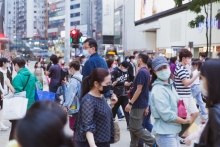
Launch of a joint project to analyse the behavioural responses to COVID-19 in Kobe, Japan
The WHO Centre for Health Development (WHO Kobe Center – WKC) will jointly conduct a research project with the Japan Agency for Gerontological Evaluation Study (JAGES) and Kobe City on the effects of behavioral changes during the pandemic on the health among the residents of Kobe, Japan. During the early stages of the pandemic, many people did not get the healthcare they needed because of fear of COVID-19 infection, imposed restrictions on movement, or unaffordability of care. In Japan, studies have shown that it was common for older people to adopt unhealthy lifestyles during the pandemic related to their diet, physical activity or social activity, thereby increasing their risks for poor health outcomes.
In this project, Kobe City’s administrative data on medical care, long-term care and public health services use and population health survey data will be analyzed, including data from a survey conducted in October-December 2023.
The findings of this research will inform policy recommendations to Kobe City for addressing the health risks to its citizens, with implications for other settings.
Please refer to the project page for more details.
Press releases about this project were issued to the Japanese media by WKC, JAGES and Kobe City.
Photo credit: WHO / Until Chan
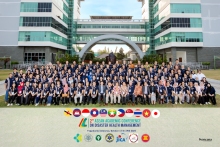
ASEAN Academic Conference 2023 in Indonesia discussed strengthening disaster health management in the region and beyond
ASEAN is committed to Disaster health management (DHM) by strengthening regional cooperation and national capacity in preparedness for and in response to health-related aspects of disasters and health emergencies. The Second ASEAN Academic Conference on DHM was held on 17th-19th October 2023 in Yogyakarta, Indonesia to promote education and academic activities through active academic networks and knowledge-sharing which was stated as one of the priority actions in the ASEAN Leaders’ Declaration on Disaster Health Management.
The Conference invited many stakeholders, including ASEAN member states, Japan International Cooperation Agency (JICA), World Association for Disaster and Emergency Medicine (WADEM), Japanese Association of Disaster Medicine (JADM) and WHO. The Conference theme was: Knowledge Co-Creation for Resilient Disaster Health Management towards “One ASEAN One Response’’. It served as a great platform to share knowledge and scientific insights, and to discuss possible future collaboration on response capacity building and research promotion through strengthening networks in the region.
Dr Ryoma Kayano, Technical Officer of the WHO Kobe Center (WKC), attended the Conference and stressed the importance of establishing active networks to achieve enhanced regional collaboration and to strengthen the national capacity of ASEAN countries. WKC has started planning a WKC Forum for February 2024 to reflect the results of the Conference and to continue the momentum of the active networks.
More information about the Conference can be found here.
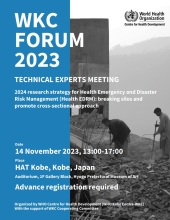
WKC Forum 2023 on Health Emergency and Disaster Risk Management
WHO Thematic Platform for Health Emergency and Disaster Risk Management Research Network (Health EDRM RN) aims to coordinate cross-regional and international knowledge sharing to effectively build scientific evidence that informs Health EDRM policies and programmes. In time with the Research Network’s core group meeting taking place in Kobe, Japan, the WHO Centre for Health Development (WHO Kobe Centre – WKC) will organise a thematic forum on Health EDRM on 14 November. The Forum is expected to bring together experts from the Kansai region and all over Japan to share ongoing initiatives and promote knowledge exchange between global and Japanese experts.
WKC FORUM 2023 TECHNICAL EXPERTS MEETING “2024 research strategy for Health Emergency and Disaster Risk Management (Health EDRM): breaking silos and promote cross-sectional approach”
Date and Time: 13:00-17:00, 14 November 2023
Venue: Auditorium, 1F Gallery Block, Hyogo Prefectural Museum of Art, Kobe, Japan
*Please note that the forum will not be held online
Meeting language: English
Registration:
- https://dx-mice.jp/EZEntry/WKCForum2023/Entry
- Closure date: 7 November 2023, 23:00 JST
- Registration fee: Free
More details on the programmes can be found here
Please contact the WKC Forum Secretariat (wkcforum2023@issjp.com) for general queries and the WHO Health EDRM Research Network Secretariat (WKC_WHO_Health_EDRM_RN@who.int) for programmes.
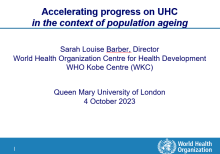
Lecture for students at Queen Mary, University of London by Director of WHO Kobe Centre
Dr Sarah L. Barber, Director, WHO Kobe Centre, presented a lecture entitled “Accelerating Progress on Universal Health Coverage in the Context of Population Ageing” on 4 October 2023, to students at Queen Mary, University of London in their coursework on Health Systems, Policy, and Performance. Dr Barber presented up-to-date results from the WHO global monitoring report on UHC on coverage and financial protection. She also discussed unmet needs for older persons. Students were encouraged to include concepts such as the right to health care and unmet need in their research projects.
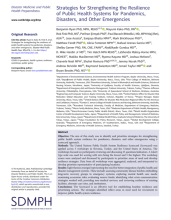
Paper published on identifying strategies for strengthening disaster resilience in communities
The COVID-19 pandemic overwhelmed many public health systems and societal functions. The impacts of disasters and response largely depend on different vulnerabilities and capacities, such as systems and infrastructures, in countries and communities.
To better understand system needs and areas for improvement in different settings, a WHO Kobe Centre (WKC) funded research project was conducted by Baylor university and Hiroshima university in partnership with 13 academic institutions across 8 countries. The United Nations Office for Disaster Risk Reduction (UNDRR) Public Health System Resilience Scorecard (the Scorecard) was used in 5 workshops in Slovenia, Turkey, and the United States of America. This paper included priority actions and strategies identified in the research project to strengthen community resilience and stronger public health systems.
Dr Ryoma Kayano, Technical Officer of WKC and a co-author of this paper, stresses the importance of multi-sectoral collaboration to enhance community resilience to mitigate the impact of emergencies and disasters in the context of COVID-19 or other possible future pandemics.
Ryan B, Kako M, Fink R, Şimşek P, Barach P, Acosta J, Bhatia S, Brickhouse M, Fendt M, Fontenot A, Arenas Garcia A, Garner S, Gunduz A, Hardin Jr M, Hatch T, Malrey-Horne L, MacDermot M, Kayano R, McKone J, Noel C, Nomura S, Novak J, Stricklin A, Swienton R, Tayfur I, Brooks B. (2023). Strategies for Strengthening the Resilience of Public Health Systems for Pandemics, Disasters, and Other Emergencies. Disaster Medicine and Public Health Preparedness, 17, E479. doi:10.1017/dmp.2023.136
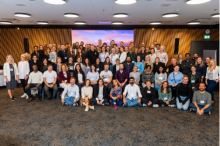
World Mental Health Day 2023 - Global Mental Health Capacity-Building Workshop in Estonia
Today 10 October 2023, is the World Mental Health Day. Globally, there is an increasing need and interest in mental health support. The World Mental Health Day provides an opportunity for all stakeholders to improve knowledge, raise awareness and drive actions that promote and protect everyone’s mental health as a universal human right.
The need to develop and strengthen Mental Health and Psychosocial Support (MHPSS) preparedness as part of emergency preparedness and risk management capacity building was emphasised during the Seventy Fourth World Health Assembly in May 2021 and was included in the updated WHO Comprehensive mental health action plan 2013-2030. The WHO Centre for Health Development in Kobe (WHO Kobe Centre or WKC) actively contributes to the World Mental Health Day through supporting research projects with universities and through participating in global MHPSS capacity building workshops.
As part of a series of the WHO capacity-building workshops to scale up MHPSS preparedness worldwide, a workshop was jointly organised in Tallinn Estonia in September 2023, by WHO and the Ministry of Social Affairs of Estonia. In total, 78 participants from 35 countries attended the workshop. A training package used in the workshop was developed by the Inter-Agency Standing Committee (IASC) MHPSS Reference Group and included modules to introduce key concepts of MHPSS, MHPSS risk assessment tools, and approaches to plan and implement effective response strategies. The activities focused on developing multisectoral MHPSS preparedness for real-world hazards and simulated response actions and coordination across actors through live interjections and case developments.
Dr Ryoma Kayano, WHO technical officer, participated in the workshop and stressed the importance of conveying capacity building trainings to develop skills to better integrate MHPSS in health emergency and disaster risk management (Health EDRM) in order to be well prepared for mental health needs in future emergencies.
Read more about the MHPSS workshop in Estonia.
The WKC web stories about first and second workshops in Tunisia are also available.

